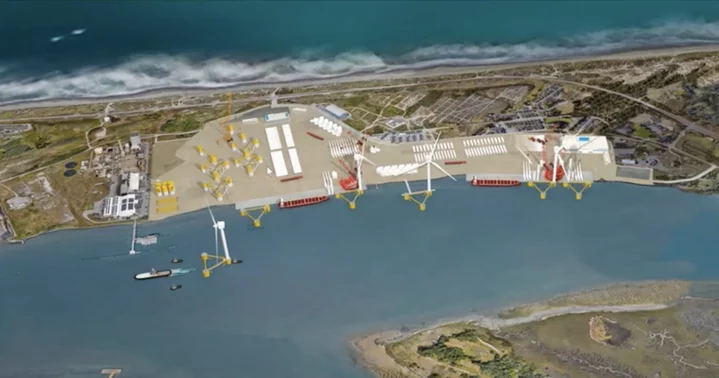A mock-up image of what the Samoa Peninsula would look like with the Redwood Marine Terminal retooled for the offshore wind industry. File graphic via the Humboldt Bay Harbor, Recreation and Conservation District.
###
This story was originally published by Canary Media.
###
A big-budget offshore wind project that would clean up a contaminated California port and turn it into America’s first hub for floating wind turbines is the latest target of an increasingly emboldened national anti-offshore wind movement.
Representatives
of a D.C.-based conservative think tank, Committee for a Constructive
Tomorrow (CFACT), and a local California community group asked the
U.S. Department of Transportation early this month to cancel a $426
million grant issued last year to repurpose the Redwood Marine
Terminal in Northern California’s Humboldt County for wind. If
successful, they could stymie the state’s plan to generate up to 5
gigawatts of offshore wind by 2030 and 25 gigawatts by 2045.
[CLARIFICATION: The community group, Responsible Energy Adaptation for California’s Transition (REACT) Alliance, is based in San Luis Obispo.]
PREVIOUSLY:
- (PHOTOS) The Biggest Federal Grant in Humboldt History? Huffman, Assorted Worthies Gather on Woodley Island to Celebrate $426 Million in Infrastructure Funding for Offshore Wind
- (VIDEO) See What Wind Turbine Assembly Would Look Like on Humboldt Bay, Courtesy of This Presentation From the Harbor District
Anti-wind activists told Canary Media they are looking to capitalize on the “timing” of a recent implosion of offshore wind plans in Maine, which — like California — sought to pioneer floating turbine technology in this country. Currently, all turbines operating or under construction in U.S. waters are fixed to the seafloor.
The move represents a westward spread of anti-wind activism from the East Coast, where longtime organized opposition has found sympathetic ears as it petitions the Trump administration to tank permitted projects.
For example, in February, groups lobbied for a halt to offshore projects already being built, an approach the Trump administration tested out in April by freezing New York’s Empire Wind installation, though construction was already underway. President Donald Trump reversed that decision after a month, but the move signaled that opposition groups have gained traction.
“They are clearly feeling emboldened by Donald Trump,” said J. Timmons Roberts, a professor of environmental studies and sociology at Brown University, who studies networks of anti-wind activists. “They are taking these local victories on the East Coast and continuing to move along.”
Both CFACT and the California community group, Responsible Energy Adaptation for California’s Transition (REACT) Alliance, are part of the National Offshore Wind Opposition Alliance, a coalition formed last year to broaden the fight against offshore wind, which had previously played out mostly at the local level.The Humboldt project was awarded the DOT grant in January 2024 and a developer has not yet been announced, but it’s been five years in the making. Humboldt Bay Harbor, Recreation, and Conservation District has already used nearly $20 million in state and federal funds to design and permit much of the planned wharf. The federal grant includes additional funds for port expansion as well as environmental restoration, a solar array, trails, public kayaking access, and a fishing pier.
Earlier this month, CFACT and REACT Alliance sent a letter to DOT Secretary Sean Duffy challenging the project’s “public interest” grant requirement, citing the “lack of viability of the floating offshore wind ‘industry.’” The letter also points to Trump’s anti-wind directive, which halted federal permitting and leasing for wind projects but did not mention grants for supporting wind infrastructure, like ports.
“We decided that the timing and the political will was there for us to go ahead and write this letter and to ask for the grant to be terminated,” said Mandy Davis, REACT Alliance’s president.
Davis told Canary Media that two recent setbacks in Maine’s pursuit of floating offshore wind motivated the group to act. First, Maine’s application for the same DOT grant awarded to the Humboldt Bay Harbor project was rejected in October. Those funds would have helped finance a port for floating offshore wind on Sears Island, Maine. Secondly, this spring, the Department of Energy clawed back a grant to the University of Maine to build and test the state’s first floating turbines.
Davis leads both REACT Alliance and the National Offshore Wind Opposition Alliance. She insists that neither of those groups receive any monetary support from CFACT, though the D.C. think tank co-signed the letter. According to the research group DeSmog, CFACT has received hundreds of thousands of dollars from fossil-fuel groups over the years.
“CFACT has, for decades, been undermining the science of climate change and attacking efforts to address the issue. This is just their latest effort to destroy a climate solution,” said Roberts.
###
Clare Fieseler, PhD, is a reporter at Canary Media covering offshore wind. Her story is reprinted here with permission.

CLICK TO MANAGE